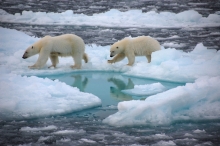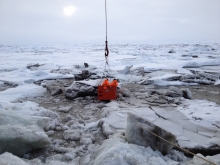The 2025 Ocean State Report from the Copernicus Marine Service, a European Union ocean monitoring organization, has found that sea floor temperatures off the coast of Nova Scotia have risen at twice the rate of surface temperatures over 30 years. Researchers say the rapid warming rate is a result of changes to the climate, including more acute marine heat waves and fewer periods of colder weather.


The threshold for dangerous global warming will likely be crossed between 2027 and 2042 – a much narrower window than the Intergovernmental Panel on Climate Change’s estimate of between now and 2052. In a study published in Climate Dynamics, researchers from McGill University introduce a new and more precise way to project the Earth’s temperature. Based on historical data, it considerably reduces uncertainties compared to previous approaches.
The Arctic Ocean will be ice-free in the summer within the next 30 years, a study says, which will result in "devastating consequences for the Arctic ecosystem," according to McGill University in Montreal. Sea ice is frozen ocean water that melts each summer, then refreezes each winter. The amount of summer sea ice in the Arctic has been steadily shrinking over the past few decades because of global warming. Since satellite records began in 1979, summer Arctic ice has lost 40% of its area and up to 70% of its volume, the Guardian said.

Summer Arctic sea-ice is predicted to disappear before 2050, resulting in devastating consequences for the Arctic ecosystem. The efficacy of climate-protection measures will determine how often and for how long. These are the results of a new study involving 21 research institutes from around the world, including McGill University.

The movement of sea ice between Arctic countries is expected to significantly increase this century, raising the risk of more widely transporting pollutants like microplastics and oil between neighbouring coastal states, according to new research from McGill University in collaboration with University of Colorado Boulder, Columbia University, and Arizona State University.
"One of the biggest icebergs on record has broken away from Antarctica, scientists said on Wednesday, creating an extra hazard for ships around the continent as it breaks up." (CBC)
“Both the Arctic and Antarctic experienced record lows in sea ice extent in November, with scientists astonished to see Arctic ice actually retreating at a time when the region enters the cold darkness of winter.” (The Guardian) (National Snow & Ice Data Center)
The second, HMS Terror, of the two Franklin Expedition shipwrecks was found earlier this month, Arctic Research Foundation expedition lead Adrian Schimnowski confirmed Monday. (Toronto Star)
Bruno Tremblay, Department of Atmospheric and Oceanic Sciences, McGill University
As an expert on ice and snow in the Arctic, he can comment about this discovery.

The 2015 United Nations Climate Change Conference, COP 21, will be held in Paris from November 30 to December 11.

